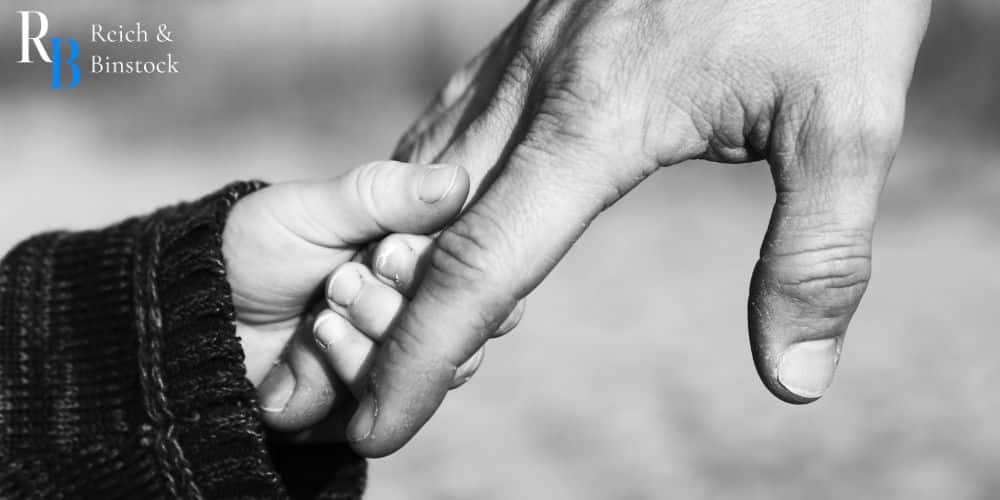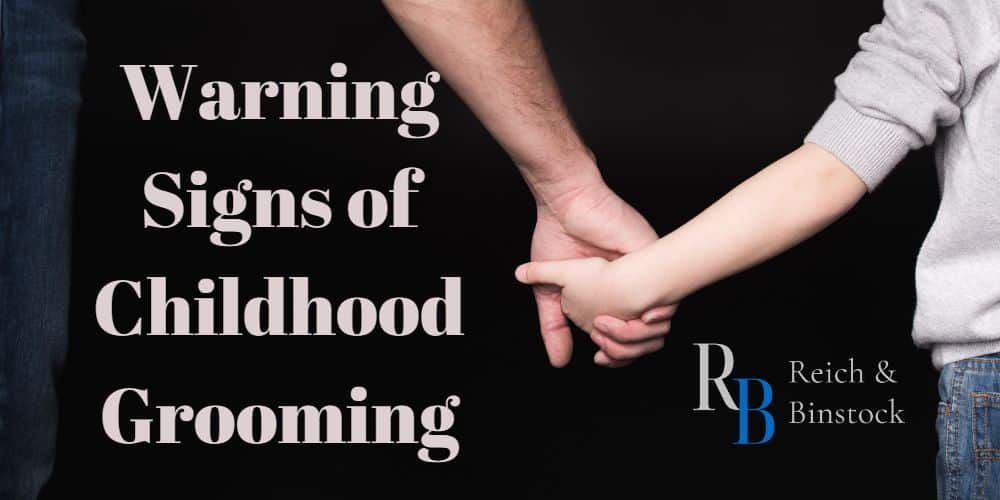The statistics surrounding child abuse are astounding. Contrary to popular belief, strangers don’t pose the highest risk to children. 93% of child sexual abuse victims know their abuser. In 34% of cases, the abuser is a family member. One in four girls and one in six boys experience sexual abuse before they turn 18. Recognizing signs of grooming behavior can potentially save your child’s life. People who suffered abuse as children are at a higher risk to have issues with mental health, addiction, and intimate abuse in adult relationships. Recognizing the warning signs of childhood grooming can help hold predators accountable for their behavior.
If you believe your child was sexually abused, legal options are available. Compensation may not reverse time, but it can help your child get the resources they need to make a physical and psychological recovery. If you have questions about how the sexual abuse attorneys at Reich & Binstock can help, contact us today. Schedule a free case evaluation to go over the details of your case by calling (713) 622-7271.
What is Grooming?
Child grooming is a way for predators to gain access to a potential victim. Grooming is a deliberate process in which an abuser can push a child’s personal boundaries and initiate a sexual or intimate relationship. Predators use grooming tactics to gain a child’s trust and gain the upper hand in the relationship. Abusers who groom their victims are less likely to be caught immediately. Up to half of sexually abused children are groomed by their abuser first. Grooming can last anywhere from a few days to a few years, the average is around 18 months.
Types of Grooming
Children can be groomed online or in person. Grooming can take many different forms, so it’s important for parents and caregivers to be aware of the different types. Below, we’ve outlined the three most common types of grooming behaviors: psychological, physical, and community.
Psychological Grooming
Parents and children can be victims of psychological grooming. This type of grooming involves the abuser trying to become a friend to the victim. They often text, email, or use other social media and make the child feel as if they can tell the abuser about issues in their life. The abuser may give their victim gifts, treats, or general attention. If the child begins to pull away or end the relationship, the abuser will often guilt them into continuing the relationship. Abusers can even threaten family, friends, and pets to force the child to continue the relationship. Because of them, the child often feels as if they can’t tell anyone about the relationship.
Physical Grooming
Adult abusers will often try to desensitize the child to their touch. It may start with pats on the head, shoulder, or arm and progress to goodbye hugs. The touches start innocently enough and progress to tickling or wrestling. If the abuser notices the victim begin to feel uncomfortable, they may back off and try again later. The child becomes comfortable with the touches and may not believe anything is wrong. The predator will begin to get more and more physically provocative, leading to sexual contact. This is also known as sexual grooming.
Community Grooming
The most alarming form of grooming is community grooming. Many child predators are seen as upstanding members of their community and are good at convincing others that they would never harm a child. Groomers are often in positions of authority that children can trust, including teachers, coaches, mentors, and counselors. Many of these positions allow unsupervised access to children. Predators are good at convincing others that they have no ill intentions. If a child does come forward with an allegation, groomers can often persuade other adults that the child is acting out for attention or otherwise troubled.
Who Can Be A Groomer?

96% of abusers are men, and 76% of abusers are married men. Predators can be family members, neighbors, and members of the community. There is no ‘typical’ child abuser. These perpetrators often go to great lengths to show that they are upstanding members of the community. Groomers are often charismatic and charming.
Parents Can Be Groomed, Too

Children aren’t the only victims of grooming. Predators often do whatever they can to gain the trust of their potential victim’s parents and caregivers. Many groomers accomplish this by offering to do things to ‘help’ the parents: babysitting, one-on-one coaching, home repairs, etc. They may also compliment your parenting style and buy gifts for the family. Many predators even start a romantic relationship with a parent in an attempt to gain access to their victim. The abuser may play with your child and offer non-sexual and non-threatening touches while you are around. This gets both your and your child comfortable with physical contact.
Stages of Grooming
Grooming is about gaining access to a victim and maintaining control in the relationship. The grooming process has six different stages.
- Locating a target and their vulnerabilities. Predators often have a specific ‘type.’ The abuser will begin to insert themselves into their victim’s life. They’ll pay special attention to the child and give them what they don’t get at home–attention, affection, or even a listening ear.
- Gain trust. Predators will do what they can to gain the trust of both their victim and the child’s family. They’ll gather information about the child and use it to establish trust.
- Filling a need. Abusers will insert themselves into the child’s life even more. They’ll give gifts, or take a special interest in what the child is interested in.
- Isolation. The abuser will begin to isolate the victim from their friends and family. They may tell the victim things like “they don’t understand you like I do.” The abuser will reassure the child that they care for them in ways others, even the child’s parents, do not. The offender will push for more time alone with the child.
- Sexualizing the relationship. Once emotional dependence has been established, perpetrators will begin pushing the relationship into new territory. Inappropriate touching usually begins at this stage. They may ask the child how much they know about sex or if they’ve ever tried it.
- Maintaining control. Once the predator begins to sexually abuse their victim, they will do everything possible to remain in control. The perpetrator may use threats of violence to control the child. They may threaten to hurt the victim or members of their family if the child tells.
Recognizing Red Flag Behavior

Being able to recognize red flag behavior can aid in protecting children from a predator. Recognizing grooming behaviors in an adult can potentially save a child’s life. Below, we’ve listed some common red flags to look for in adults who associate with your children.
- Giving gifts to the child or family members
- Paying a disproportionate amount of attention to one or a few children
- Communicates with the child over text, email, or social media without parental knowledge
- Shares secrets or sensitive information with the child
- Adults who would rather spend time with children than with other adults
- Repeatedly trying to have alone time with a child–tutoring, camping, babysitting, etc.
- Giving drugs, alcohol, or cigarettes to teenagers
Grooming can happen in person or online. Offenders can use the internet to get just as much information or even more information than they could in person. Offenders may pretend to be someone of the same age and infiltrate the child’s life. Teenagers can be groomed by those older than them. These adults may say things like “you’re so mature for your age” and convince the teen to sneak out to meet them. Many teenagers are aware of online predators, but it’s almost impossible to know if someone is who they say they are.
Signs of Child Sexual Abuse

While it’s important to keep an eye on the adults in your child’s life, it’s just as important to keep an open relationship with your child. Recognizing new behavior in your child could mean that you catch the grooming behavior before it escalates into a sexual relationship. It’s important to let your child know that they can talk to you if they feel unsafe. Some of the common signs of sexual abuse in children include:
- Sudden change in behavior
- Change in eating habits
- Change in sleeping habits
- Spending less time with their usual friend group
- Is more secretive with their thoughts or feelings
- Has unexplained gifts and toys
- Spending time with one particular adult
- Self-harm
- Asking sexually explicit questions to other children or other adults
Child Protection After Suspecting Abuse

If you have reason to believe your child has been sexually abused, contact the authorities immediately. Directly confronting the suspected person can result in a violent escalation of the behavior. The authorities can work with you and your family to get the necessary information and evidence to pursue criminal charges. The authorities can also get your child the professional help they need after sexual abuse.
How Can A Sexual Abuse Lawsuit Help?
Unlike criminal courts, civil lawsuits aren’t bogged down with the same burden of proof. A civil lawsuit can help you and your child receive compensation for the injuries they sustained by a child sexual abuser. In some cases, a civil lawsuit for sexual abuse victims can focus on the organization that allowed the behavior to occur. At Reich & Binstock, our Houston sexual abuse attorneys have pursued sexual abuse claims against organizations like:
- The Boy Scouts of America
- Jehovah’s Witness
- Latter-Day Saints (LDS) Mormon Church
- Summer camps
- Public and private schools
Sexual Abuse Lawyers at Reich & Binstock Can Help
Children and teens who suffer through sexual abuse often have lasting damage. Sexual abuse as a child can lead to depression, PTSD, anxiety, and an increased risk of substance abuse. The healing process often involves expensive therapy that lasts for many years. A sexual abuse lawsuit can help you recover compensation for your child’s injuries and trauma. For a free and confidential consultation, call the child sexual abuse attorneys at Reich & Binstock today at (713) 622-7271.














